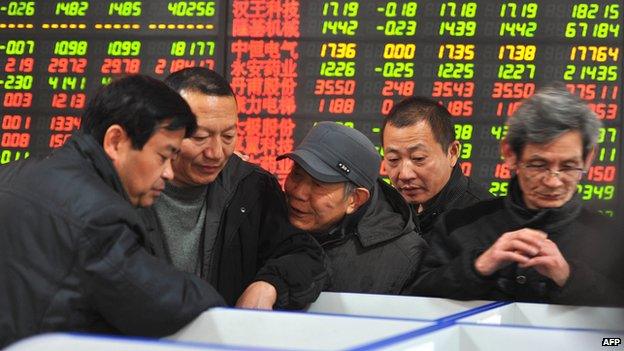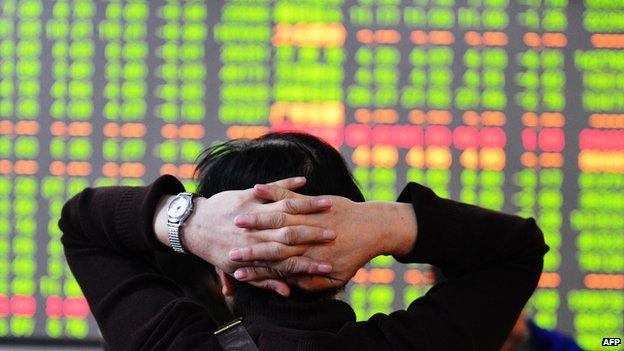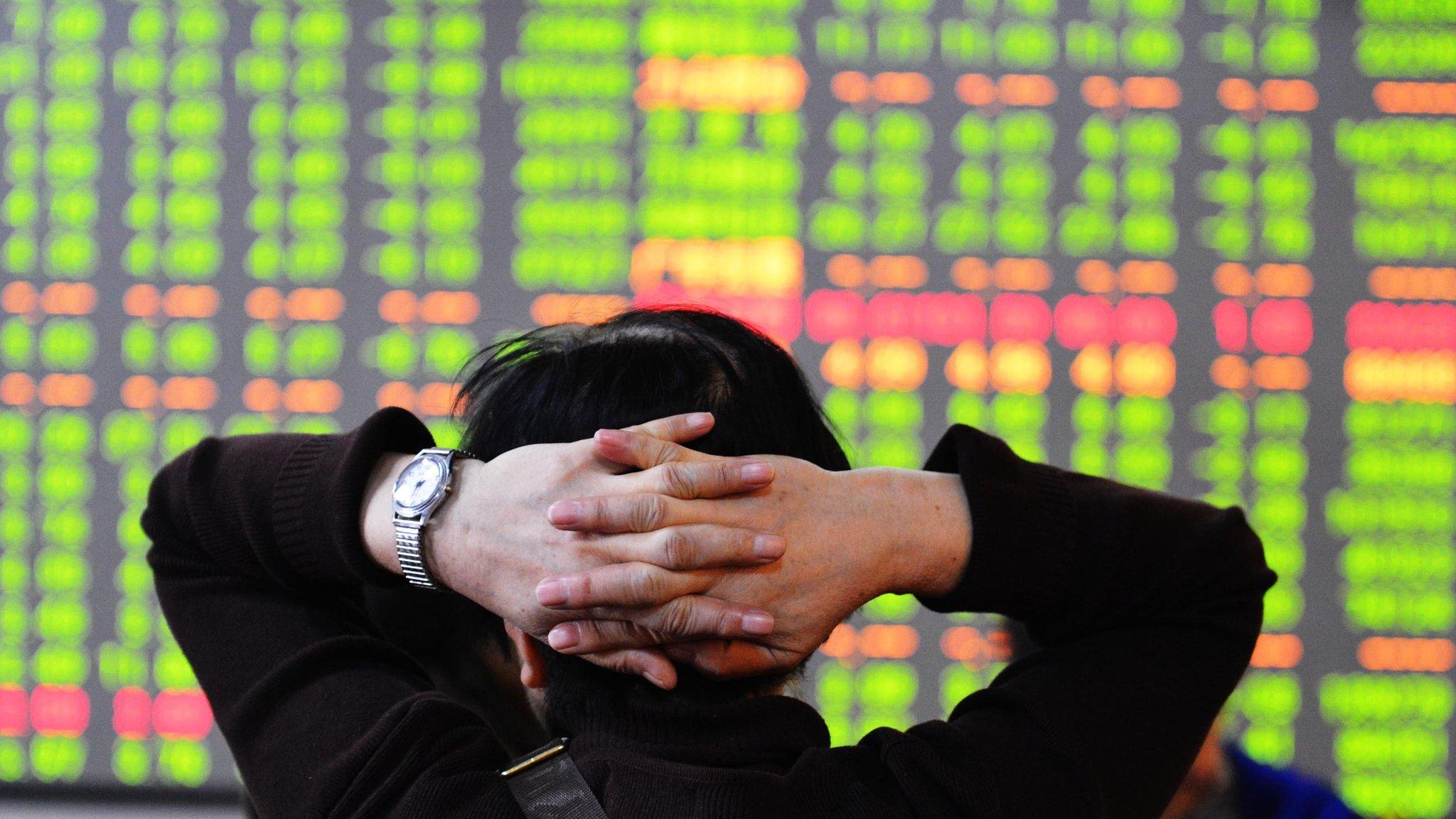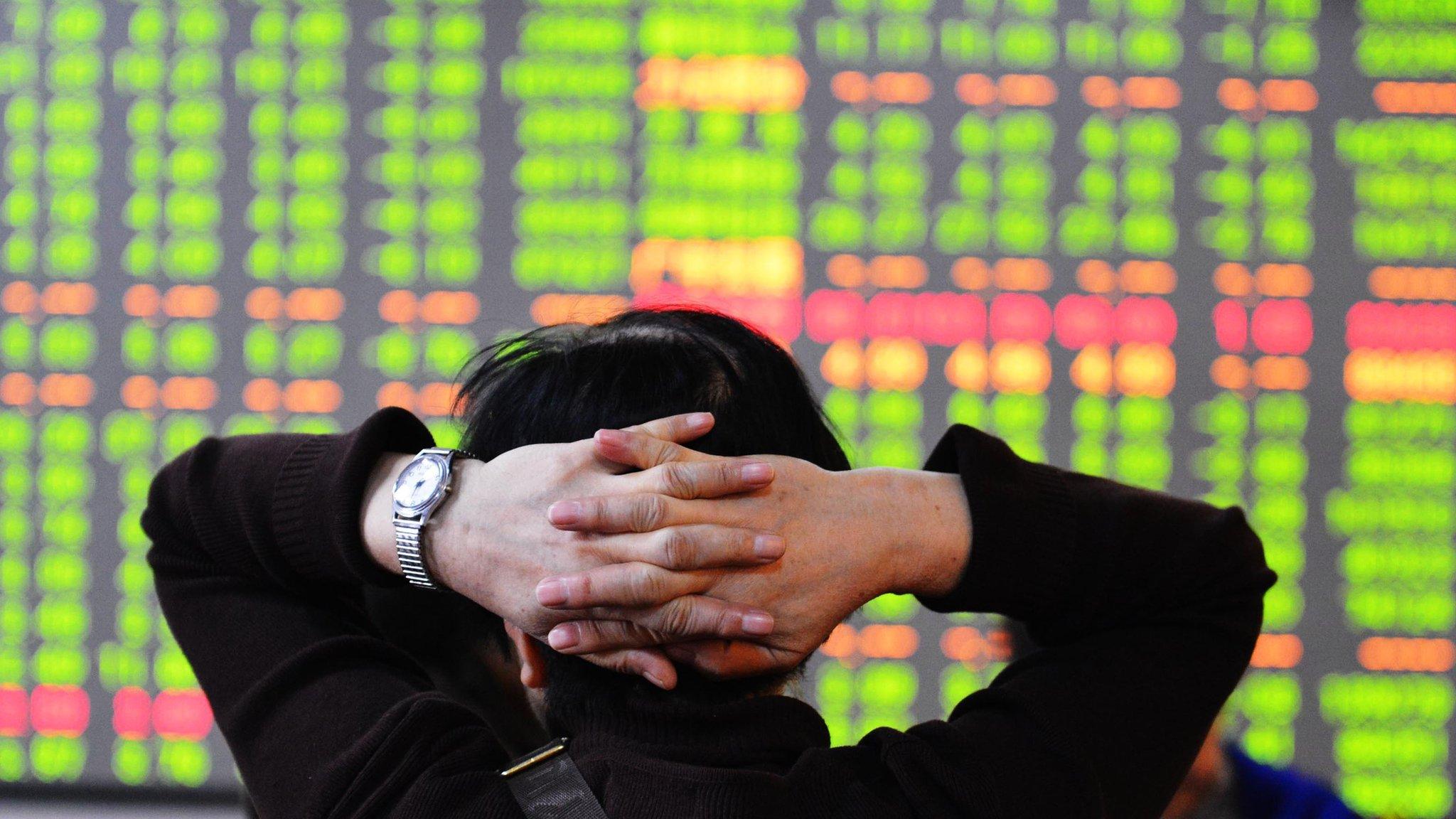Chinese shares rose 'too high too fast', say analysts
- Published

This week marked the worst showing for Shanghai shares in seven years
Mainland Chinese shares saw steep falls this week, leaving market watchers wondering if the bull run the stocks have been on is running out of steam.
The benchmark Shanghai Composite closed down over 6% on Friday, ending the week more than 13% lower, which is its worst weekly performance since the global financial crisis in 2008.
Yet analysts told the BBC the rally in the stock market is far from over.
This week's fall was just a correction which may continue, they said.
After rising 140% over 12 months and about 50% just this year, such volatility in the Chinese market is to be expected because "it has risen a bit too far too fast," said Shane Oliver, head of investment strategy at AMP Capital.
"The easy gains are probably over and a period of correction would be healthy," he said.
Bernard Aw, market strategist at trading firm IG backed that view, adding that the move down this week triggered by government measures is actually improving the quality of the market's upward trajectory.
"The government is still looking for a higher stock market, because they think a higher market is actually beneficial for the economy," he said.
"But having said that they don't want to see one that is rallying too fast, or a bull run that goes out of control, which is why we are seeing all these tightening measures coming in."
Tightening measures
Last week Friday, Beijing introduced fresh measures to curb margin lending by brokerages to investors, which has been a big driver of the mainland market, where about 80% of the investors are small investors, according to analysts.

What is margin trading?
It is a high-risk investing strategy that can produce big profits or big losses
Investors use their own money for a portion of their stock purchase
The remainder is borrowed from a broker
It allows investors to make bigger bets or buy more stock than they can normally
The broker charges interest on the loan, which can lead to debts if the investor's stock bet goes wrong

The China Securities Regulatory Commission (CSRC) published rules that would limit the size of the country's margin lending and short selling by law for the first time.
It also demanded that broker firms make sure they do not allow lending to clients through illicit channels.
While investors are naturally worried about the restrictions placed on margin lending, Mr. Aw of IG said it is not surprising, because the curbs have been happening since the start of the year.
"The CSRC has come up with restrictions on margin financing since the start of the year. Some bans were in place in some large brokerages on 18 January, " he said.
Drawing up liquidity
The other major factor that has been weighing on Chinese shares this week has been the flurry of stock market flotations hitting the market.
A batch of 25 new listings this week was expected to lock up a record $1.1tn (£693bn) worth of funds for Initial Public Offering (IPO) subscriptions, according to Mr Aw.
With Chinese regulators planning to push ahead with more IPOs to cool the red hot market, he said the government is "trying to spread the huge amount of liquidity in the system to more companies".
"They are stepping up - they're doubling the number of IPO approvals in one month," he added.

Analysts expect Chinese shares to continue to head higher with periods of volatility ahead
Volatility ahead
With more IPOs ahead, analysts agree there may be more correction periods in store for the market, but they also added that it's too early to call for an end to the bull run that's lasted some two and a half years.
Last year, the Shanghai Composite was the best performing major benchmark index in the world, rising 53%.
Jason Hughes, head of Singapore at trading firm CMC Markets, said this week has been tough for markets around the world, not just in China, because of the debt crisis in Greece.
"With the global situation a little more precarious than it has been with a lot of focus on Europe - what happens in Europe may be the catalyst for a wider sort of correction around global markets," he said.
"We may well see China continue to outperform the other markets."
Mr Oliver of AMP Capital points out that Chinese equities are still relatively cheap and more expected easing by the central bank to boost a slowing Chinese economy will help the stocks.
"It's worth reiterating that the Shanghai Composite index on an historic PE (price to earnings ratio) of 21 times is still below its long term average," he said.
Mr Aw of IG agreed, saying the benchmark index will transition into a slow bull market, rather than the "crazy" move up that we have seen over the past 12 months.
"A downtrend or correction will actually be more positive for investors, because now there's talks about high valuations, so if you see a decline, this will make the valuations more attractive for investors coming in to buy on the cheap."
He predicts the Shanghai index will jump almost 12% by the end of the year to breach the key psychological level of 5,000 again.
- Published13 January 2015

- Published19 June 2015
